“There was nothing organic on the shelves at any stores,” she said. “There were no natural foods. You couldn’t find things like whole wheat flour or organic oats.” The East Lansing Food Co-op was the only place available.
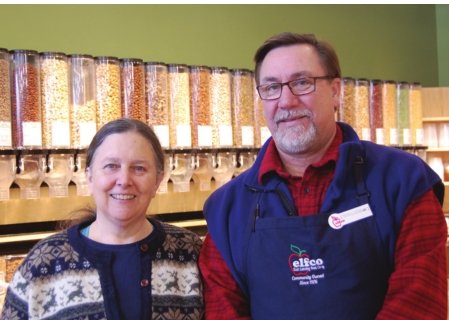
Three and a half decades later, a lot has changed. Big grocery chains like Meijer and Kroger devote entire sections of their stores to organic and natural options, and shoppers are inundated with promotions for gluten free, non-GMO and fair trade offerings. Even Walmart, the perennial super-villain in the anti-big box crusade, devotes valuable shelf space to organic vegetables and grass-fed beef.
Over at the East Lansing Food Co-op, better known as ELFCO, Woiwode is president of the co-op’s board of directors. ELFCO celebrates its 40th anniversary this weekend, but its future in the community is uncertain as big box stores and an increasing number of health food options chip away at ELFCO’s market share. And you can’t talk about ELFCO’s future without addressing the grass-fed, free-range elephant in the room ... er, across the street: Whole Foods. The national health food chain’s Meridian Township location has been in the works for years, but has been delayed by construction setbacks. While it hasn’t announced an official opening date, sources close to the store expect a mid-April opening.
With the health food colossus poised to open soon, local health food stores are battening down the hatches, hoping that a mix of customer service, community investment, environmental stewardship and education can keep their shops afloat. Some are hoping that the rising tide lifts all ships, while others fear that small, locally-owned shops will capsize in the wake of S.S. Whole Foods.
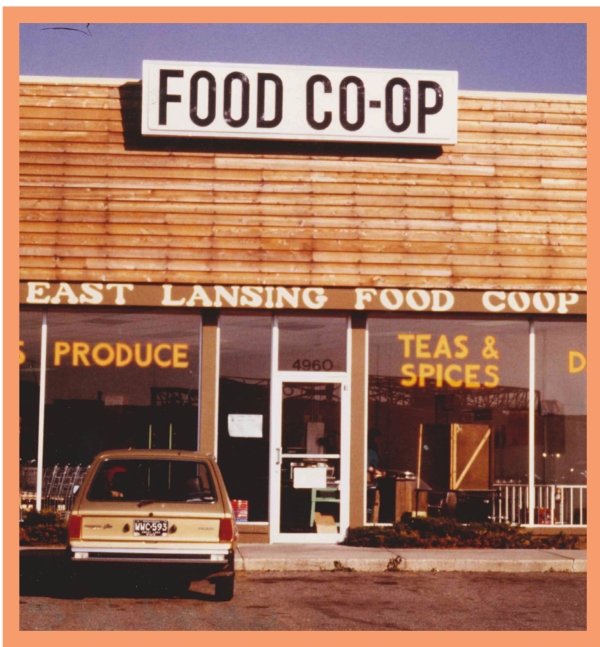
The next 40
ELFCO began as a health food buyers club in the early ‘70s and officially incorporated as a food co-op in 1976 with 30 members. The co-op celebrates its 40th anniversary Saturday with food samples, prizes and live entertainment. ELFCO moved to its current home, a 4,500-square-foot storefront on Northwind Drive, 35 years ago. The anniversary is a great opportunity to look back on the co-op’s history, but its also important to look to the future.
“We’re at a bit of a crossroads,” said Bruce Grambau, general manager of the co-op. “We’ve had quite an influx of new markets.”
One of those new markets is the Fresh Thyme Farmers Market that took the place of Grambau’s former employer, Goodrich’s Shop-Rite. Grambau came to ELFCO in August 2014 after Goodrich’s closed and took over as the co-op’s general manager in July.
Grambau, who spent 40 years at Goodrich’s, is hoping to use his experience to “streamline” ELFCO’s operations. Of course, it’s not all about profits for ELFCO. Like many socially conscious businesses, ELFCO follows a “triple bottom line” approach to business: financial stability, environmental kindness and social responsibility.
“We reinvest in the community,” Woiwode said, adding that the co-op recently loaned $10,000 at no interest to one of its vendors so he could build a hoop house to grow vegetables during colder months.
“That commitment is something you’ll never see from a nationally owned corporation.”
The commitment to the environment can be seen on ELFCO’s shelves. Shoppers are encouraged to bring their own containers for bulk foods, and milk is sold in returnable glass bottles. Both moves reduce plastic waste. The store also installed a solar array on its roof and solar tubes — roof-to-ceiling tubes that focus sunlight and reduce the need for interior lighting — to cut down on energy costs.
But all of this commitment to community and ecology comes at a cost, which is reflected in higher food prices. While ELFCO belongs to a co-op network that gives it some leverage in buying, it doesn’t have the clout of major chains like Kroger or Whole Foods. Shopping at ELFCO, in this regard, is almost a political statement. Shoppers willingly pay more to support a store that supports their ecological and social worldview.
As for financial stability, ELFCO recently raised its lifetime ownership share price from $60 to $240 and asked existing owners to pony up the $180 difference. While the co-op painted the move as an overdue adjustment to make up for the rising cost of food, one member compared the moved to changing the terms of a “done deal” to reach into its members’ pockets. Grambau estimates that “a couple thousand” of the store’s 3,000 owners are still regular shoppers. If even 1,000 owners go for the new deal, that could put an additional $180,000 in the co-op’s coffers as it prepares for Whole Foods’ arrival.
The co-op has flirted with a Lansing location for years, either as a second location or an outright move, eyeing neighborhoods like Lansing’s east side where fresh food options are scarce. It’s home on Meridian Township’s Northwind Drive is tucked away, off of Grand River Avenue, which decreases the shop’s visibility. Woiwode said the co-op is still open to other locations but that ELFCO owns its building and has invested in it, so a full-on move is hard for many of the owners to stomach. As it stands, the co-op has no big plans on the horizon and is hoping a few tweaks will help the shop’s longevity.
“We’re trying to educate new members of the community about us,” Grambau said. “We haven’t done the best job marketing ourselves.”
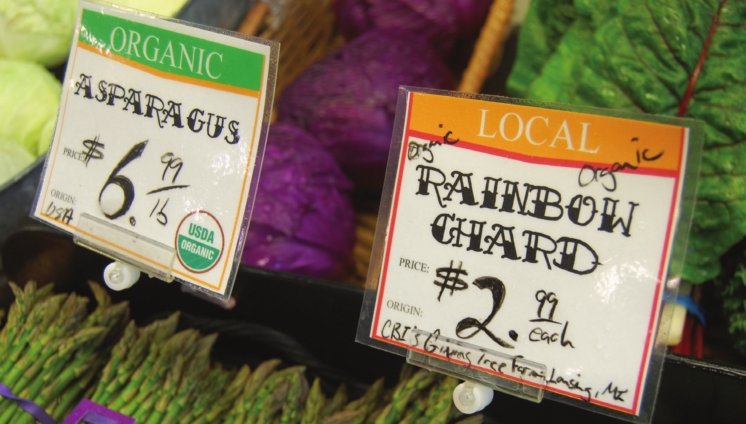
“Everyone is invited to come in. That’s an important message to get out,” Woiwode added, noting that many community members think of the co-op like a Sam’s Club or Costco store where membership is required. While ELFCO owners get some special discounts, one does not need to be an owner to shop at the co-op.
Health food district?
Less than half a mile to the east, Foods for Living is also bracing for the arrival of its new neighbor. While ELFCO is a cozy shop like one might find in a hip big city neighborhood, Foods for Living feels much bigger and, well, a bit like Whole Foods. At 17,000 square feet, however, Foods for Living is about half the size of the 35,000-squarefoot store going in across the street.
“This happens to me 10 times a day,” said store director Kirk Marrison when asked about the upcoming Whole Foods opening. And while he has concerns about the health food giant coming to his neighborhood, he’s used to fighting for his place at the table. As healthy food options have become trendy and big box stores have gotten in on the action, it has cut into the market share of smaller shops.
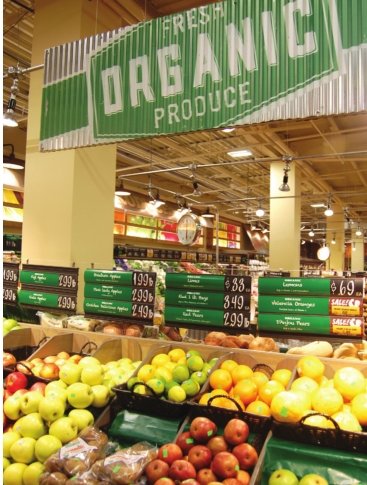
“The mass market is already there,” Marrison said. “All the product lines we cultivated for 20 years are now available at Target and Meijer. Everybody’s throwing their hat in the ring.”
While Foods for Living is employee owned, it features a tight leadership structure where buyers are given a lot of freedom to try new products, as long as they fall within the store’s standards for health and quality.
“We have the fleetness to make quick judgments,” Marrison said. “If someone comes to us with a good product, it could be on the shelf by the end of the day.”
This flexibility allows the store to jump on health food trends quickly.
“We had the best selection of gluten-free products before gluten-free went haywire,” Marrison said. “We dedicated an entire aisle to it.”
Marrison is hoping the opening of Whole Foods will create something of a health food district and thinks it may even draw more shoppers to the area — and to Foods for Living. He notes that many of his customers are multi-stop shoppers who pick up many grocery items from Kroger or Meijer before stopping at Foods for Living.
“Whole Foods has a kind of notoriety; people know it by name,” Marrison said. “We’ll see what the market can support.”
{::PAGEBREAK::}
Healthy education
Farther west, two health food stores are more insulated from Whole Foods’ arrival, both in terms of geography and structure. The Better Health Store in Frandor and Fresh Thyme Farmers Market near the corner of Trowbridge and Harrison roads are both backed by the strength of regional chains. The Better Health Store chain comprises nine grocery stores and four vitamin/ supplement shops stretching from Greater Lansing to Metro Detroit. Fresh Thyme boasts four stores in Michigan and 30 in the Midwest. Its 31st store opens in Grand Rapids today.
Robert Lajcaj, store director for East Lansing’s Fresh Thyme, said the store’s first 10 months have been very positive.
“It’s been better than we expected,” he said. “We were nervous. We knew we were replacing a really excellent store.”
At 30,000 square feet, Fresh Thyme is the largest health food shop in Greater Lansing — at least until Whole Foods opens its doors. Lajcaj isn’t too concerned about Whole Foods, however, because he sees a different market for Fresh Thyme.
“We find the Whole Foods model very attractive, but they’re very high priced,” he said. “We’re aiming for the middle class. We’re not pushing for that upper-class clientele.”

Fresh Thyme’s approach is closer to that of Trader Joe’s, from price tier to aesthetic. Fresh Thyme’s faux wood and reclaimed steel signs will certainly feel familiar to shoppers of the laid-back West Coast-based chain.
(As for those persistent rumors that Trader Joe’s coming to the area, a spokesperson for the company said that the Greater Lansing area is not in its two-year plan for new stores.)
Lajcaj expects Whole Foods to take some of Fresh Thyme’s customers, but he said the store is planning an aggressive marketing campaign to retain current customers and draw in new shoppers. The store will soon accept MSU PayCards, reloadable debit cards where students and employees can deposit paychecks and financial aid. It has also set up purchase plans with MSU so that departments on campus can use the store for catering or other needs. Lajcaj also believes that Fresh Thyme’s staff can offer superior customer service to that of big box stores.
“All those markets have a lot of great products, but we have people that are very knowledgeable and talented,” he said.
Paul Kennedy, store director at Frandor’s Better Health Store, echoes that sentiment.
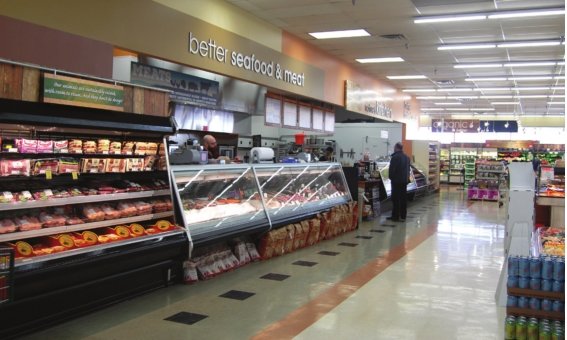
“If you come in here, you can get more than a box of healthy corn flakes,” he said. “You get an education.”
The store recently completed renovations that allowed it to expand its café offerings and increase its retail floor space to about 19,000 square feet. The revamped café offers a variety of hot meals, salads, sandwiches, smoothies and hamburgers made with grass-fed beef, plus a butcher counter.
“Our store needed a facelift,” said Kennedy, noting that the store has been at that location for 15 years.
Better Health also has a west Lansing location on Saginaw Highway that is much smaller and doesn’t offer fresh produce or have a café. Its selection is mostly boxed and canned foods, vitamins and supplements and household goods.
Kennedy said he doesn’t lose much sleep worrying about the big box stores eating into his profits.
“They’re getting in on the ‘fad,’” he said, “But we don’t think it’s a fad. We think it’s a growing trend. It’s been growing for some time. Our whole store is healthy stuff. Kroger has what, two aisles?”
In recent years, Kennedy said, the public’s increased interest in healthy living has led to more options available on the market.
“There’s a larger selection of grocery products,” he said. “The supplements have grown, and the health and beauty products have really taken off.
As for the opening of Whole Foods? Kennedy is firmly in the rising-tide-raises-all-ships camp.
“Competition is good,” he said. “That’s what this company is built on. It makes everybody better.”
Support City Pulse - Donate Today!
Comments
No comments on this item Please log in to comment by clicking here